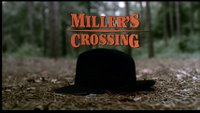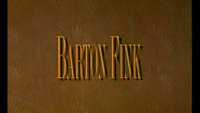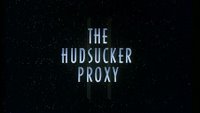Coen (1990-1994)
 1990 - Miller's Crossing - The Bros. tackle 1929. Cut from the same cloth as Yojimbo and A Fistful of Dollars. While the plot does offer some surprises, its basic structure is solidly in the "double-crossing criminals" subgenre. Making the main character a loyal-but-tormented gangster, rather than an unaffiliated drifter, and adding the love for a dame into the mix helps to differentiate the film from its antecedents. The most fun, for me, in this film comes from the dialogue. The Bros. seemed to have stuffed every single piece of Prohibition-era slang into the script. Sometimes the characters' conversations border on incomprehensible, but it helps add, along with the endlessly firing Tommy guns and the obsession with fedoras, to the hyper-gangster reality of the film's universe.
1990 - Miller's Crossing - The Bros. tackle 1929. Cut from the same cloth as Yojimbo and A Fistful of Dollars. While the plot does offer some surprises, its basic structure is solidly in the "double-crossing criminals" subgenre. Making the main character a loyal-but-tormented gangster, rather than an unaffiliated drifter, and adding the love for a dame into the mix helps to differentiate the film from its antecedents. The most fun, for me, in this film comes from the dialogue. The Bros. seemed to have stuffed every single piece of Prohibition-era slang into the script. Sometimes the characters' conversations border on incomprehensible, but it helps add, along with the endlessly firing Tommy guns and the obsession with fedoras, to the hyper-gangster reality of the film's universe. 1991 - Barton Fink - The Bros. tackle 1941. I still feel like I don't get the film. I'm comfortable with the big ideas in it. I get that Hollywood claims to champion creativity, but will destroy the soul of any creative people in its grasp. I get that so-called champions of the common man often don't understand common men at all. I get that Barton is psychotically trapped in his "life of the mind," whereas his oppositely-sized and -demeanored neighbor Charlie lives a psychotic life of the flesh. I'm not solid with other pieces of the film. For example, Barton gets Audrey to come over to help him come up with an outline for his script. Audrey has a good head for such things, having helped Mayhew write his books and scripts. Instead of working, they have sex. Later, Charlie gives Barton a package to hold onto for him, which I assume contains Audrey's severed head. With Audrey's mind, severed from her body, on his desk, Barton not only breaks his writer's block, but writes the best work of his life. Why this is so I can come up with a few ideas, but I don't have a definitive answer. Which, of course, only makes the film fun to watch repeatedly.
1991 - Barton Fink - The Bros. tackle 1941. I still feel like I don't get the film. I'm comfortable with the big ideas in it. I get that Hollywood claims to champion creativity, but will destroy the soul of any creative people in its grasp. I get that so-called champions of the common man often don't understand common men at all. I get that Barton is psychotically trapped in his "life of the mind," whereas his oppositely-sized and -demeanored neighbor Charlie lives a psychotic life of the flesh. I'm not solid with other pieces of the film. For example, Barton gets Audrey to come over to help him come up with an outline for his script. Audrey has a good head for such things, having helped Mayhew write his books and scripts. Instead of working, they have sex. Later, Charlie gives Barton a package to hold onto for him, which I assume contains Audrey's severed head. With Audrey's mind, severed from her body, on his desk, Barton not only breaks his writer's block, but writes the best work of his life. Why this is so I can come up with a few ideas, but I don't have a definitive answer. Which, of course, only makes the film fun to watch repeatedly. 1994 - The Hudsucker Proxy - The Bros. tackle 1958, though many of the situations and one entire character were lifted from 1941's Meet John Doe. I'm not sure what went wrong with this one. The comedy falls flat most of the time. The arc of Tim Robbin's character is predictable. The deus ex machina (near literally) ending comes out of nowhere to provide an unsatisfying ending. Was it Sam Raimi's help with the script? Studio interference? Or, was it just time, after four solid films, to swing and miss?
1994 - The Hudsucker Proxy - The Bros. tackle 1958, though many of the situations and one entire character were lifted from 1941's Meet John Doe. I'm not sure what went wrong with this one. The comedy falls flat most of the time. The arc of Tim Robbin's character is predictable. The deus ex machina (near literally) ending comes out of nowhere to provide an unsatisfying ending. Was it Sam Raimi's help with the script? Studio interference? Or, was it just time, after four solid films, to swing and miss?



